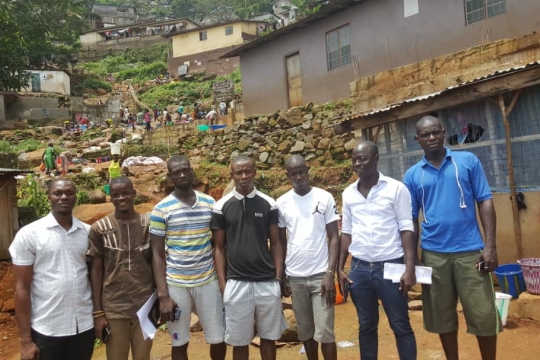Brighter Communities, Safer Cities: Summer Scoping
Written By: Kevin Grieco
Edited By: Alicia Oberholzer & Thomas Klug
Urban electrification rates in Sierra Leone are among the lowest in the world, hovering around 11%. These already low electrification rates plummet towards zero in poor slum areas of the city. One consequence of this urban energy poverty is an absolute lack of nighttime lighting and public streetlights.
Much of the current literature investigates the effects of streetlights on crime, generally finding that increased lighting does reduce crime. These studies are set in countries where security is provided by formal security actors, namely the police. However, in many developing countries informal security groups are more important for security provision than formal state police. The distinction between formal and informal security actors may matter when considering the effects of nighttime lighting on community safety and crime. On the one hand, it could be that unpaid informal security groups feel their efforts are not as needed when streetlights are installed. Or it could be that these groups feel more comfortable patrolling the streets at night when streetlights are installed.
With summer research funding from SETI, I developed a research project on energy poverty, crime, and informal security groups. A central goal of this project was to test the effectiveness of a large-scale streetlight intervention in Freetown, Sierra Leone. Several primary research questions guided the project:
- What is the relationship between energy poverty and crime in developing countries?
- In the absence of formal police, what is the role of informal actors in the provision of security?
- In low capacity states, what strategies can policy makers employ to improve the performance of informal security groups and support the reduction of neighborhood crime?
I arrived in Freetown with two primary objectives. First, I wanted to learn more about informal security groups. I had heard about informal security groups during my previous trips to Sierra Leone and I had read qualitative accounts, but systematic data is lacking. How active or well-known are informal security groups? Are these groups trusted by members of their community? How are they organized?
After discussion with police and local stakeholder, I came to the understanding that nighttime security is provided by Community Security Volunteers (CSVs), community members who are formally registered with local police stations and under the official supervision of each Police Station’s Community Relations Officer. Yet, the management of CSVs is largely delegated to communities. Each region of Freetown is divided into patrol “zones”, where communities form advisory boards to recruit CSVs, raise resources, and manage nighttime patrols.
To better understand CSV groups, I fielded a team of 10 enumerators and conducted a household level survey in 10 neighborhoods across Eastern and Central Freetown (Note: The selection of these neighborhoods was non-random; we intentionally selected some neighborhoods due to large slum areas). From this survey, two findings findings stand out:
- Police presence varies across communities, but presence and community approval of police are low in many neighborhoods.
- In contrast with police, CSV groups (informal security groups) are present and overwhelmingly approved by community members.
These findings give me confidence CSV groups are active, their members well-known and that local communities would benefit from policies aimed at increasing the activities of CSV groups.
My second goal in Freetown was to probe the local interest and political feasibility of a large-scale streetlight intervention. Local politicians in Freetown City Council (FCC) fully supported the idea of a large scale streetlgiht intervention in Freetown. To “test-drive” this idea, we are working with Freetown Mayor Yvonne Aki-Sawyerr and local councolors, in conjunction with Freetown-based solar electricity firm EasySolar, to set up streetlights in three neighborhoods in Central and Eastern Freetown: Cline Town, Kroobay, Greybush. We brought together local leaders from the three target communities and politicians from the FCC to decide on locations for the proposed streetlights. Locations have been selected and installation was scheduled for early January.
There are several next steps in this project:
- Conduct a medium-scale pilot intervention that finalizes technical specifications for the streetlight intervention.
- Develop a strategy for accurately measuring and geo-locating crime events, as official statistics are unreliable.
- Consider alternate strategies for increasing CSV activity and security quality, working in conjunction with FCC, community security groups, and community leaders.
